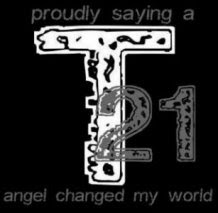Her son is still EXACTLY who he was before this "dreaded" diagnosis was applied to him. NOTHING -- not even those 6 letters -- can change who he is or what he is or isn't capable of... And, no one can predict the limitations of another. Don't let anyone tell you otherwise.
What is a diagnosis? Webster says it is, "the art or act of identifying a disease from its signs and symptoms". An ART! Psychology is an art that uses scientific methodology. It is generally not black and white but rather can be VERY grey at times!  Note that having identical twin sons with Down syndrome, I recognize that very black and white science was used in identifying their disease. That is, the extra chromosome is either there or it is not. In their case it is and their diagnosis of Down syndrome is a scientific, black and white, diagnosis! However, what they can achieve in their lives is not black and white and cannot be accurately predicted by their diagnosis. This has been proven historically, as we have seen great strides and progress in the achievements of people with DS with greater acceptance into society and the advent of early intervention and special education.
Note that having identical twin sons with Down syndrome, I recognize that very black and white science was used in identifying their disease. That is, the extra chromosome is either there or it is not. In their case it is and their diagnosis of Down syndrome is a scientific, black and white, diagnosis! However, what they can achieve in their lives is not black and white and cannot be accurately predicted by their diagnosis. This has been proven historically, as we have seen great strides and progress in the achievements of people with DS with greater acceptance into society and the advent of early intervention and special education.
 Note that having identical twin sons with Down syndrome, I recognize that very black and white science was used in identifying their disease. That is, the extra chromosome is either there or it is not. In their case it is and their diagnosis of Down syndrome is a scientific, black and white, diagnosis! However, what they can achieve in their lives is not black and white and cannot be accurately predicted by their diagnosis. This has been proven historically, as we have seen great strides and progress in the achievements of people with DS with greater acceptance into society and the advent of early intervention and special education.
Note that having identical twin sons with Down syndrome, I recognize that very black and white science was used in identifying their disease. That is, the extra chromosome is either there or it is not. In their case it is and their diagnosis of Down syndrome is a scientific, black and white, diagnosis! However, what they can achieve in their lives is not black and white and cannot be accurately predicted by their diagnosis. This has been proven historically, as we have seen great strides and progress in the achievements of people with DS with greater acceptance into society and the advent of early intervention and special education. Obtaining a diagnosis through behavioral observation and psychological analysis -- despite using scientific methods -- is NOT black and white. (FYI - My undergraduate degree is in Psychology, Psychology for Exceptional Children, and Art.) A set of symptoms -- read: physical and cognitive behavior -- can be misread and, potentially, misdiagnosed. I'm not insinuating that you should deny the diagnosis because you don't want "that" disease. The diagnosis assigned will most accurately reflect the set of behaviors that are being observed by the psychologist at the time of evaluation/examination. Still, knowing how one comes to a diagnosis is important to consider. My boy's diagnosis is 100% scientific based on the presence of an identifiable genetic condition. My friend's son's diagnosis is in the grey area -- using scientific methods to observe and analyze behavior. In either case, the diagnosis STILL cannot necessarily accurately predict the outcome.
So, what's the point of a diagnosis then? Well, in both of these cases, a diagnosis identifies a set of symptoms -- behavioral and/or physical -- that allows us to obtain services to address these specific symptoms. My boys' diagnosis qualifies them to receive physical therapy, occupational therapy, speech therapy and special education according to their specific needs in these areas. My friend's son's diagnosis allows her to obtain services such as socialization therapy, ABA educational services and others that might otherwise have been denied, to help address his specific behavioral symptoms. A diagnosis is an incredibly good and necessary thing when dealing with government agencies responsible for doling out services to hundreds of thousands of children with various types and levels of special needs. Bottom line, a diagnosis is not something to avoid or fear. It does not change who your child is but may change how readily you are given services to assist with your child's development.
USE the diagnosis to get what you need and, as necessary, to help you understand your child's development or behavior. But, discard it as a label for your child. The only LABEL I need, want or will allow for my children are their given names. They are NOT "Downs kids" as so many people refer to them and others with DS (and I feel compelled to politely correct)! They are Brian and Michael. Their DIAGNOSIS identifies a set of symptoms and their genetic condition. Their names represent WHO THEY ARE. And, no one -- not the scientists that diagnosed my sons' DS or the psychologists that diagnosed PDD-NOS for my friend's son -- can know what their future holds or what they are capable of achieving.
Do not let a diagnosis cloud the way you, or others, see your child! While you should use your diagnosis to proactively obtain the specific services and whatever help your child needs to develop to his fullest potential... Most importantly, stay focused and BELIEVE in the individual strengths and characteristics that make your child who he is.


















No comments:
Post a Comment